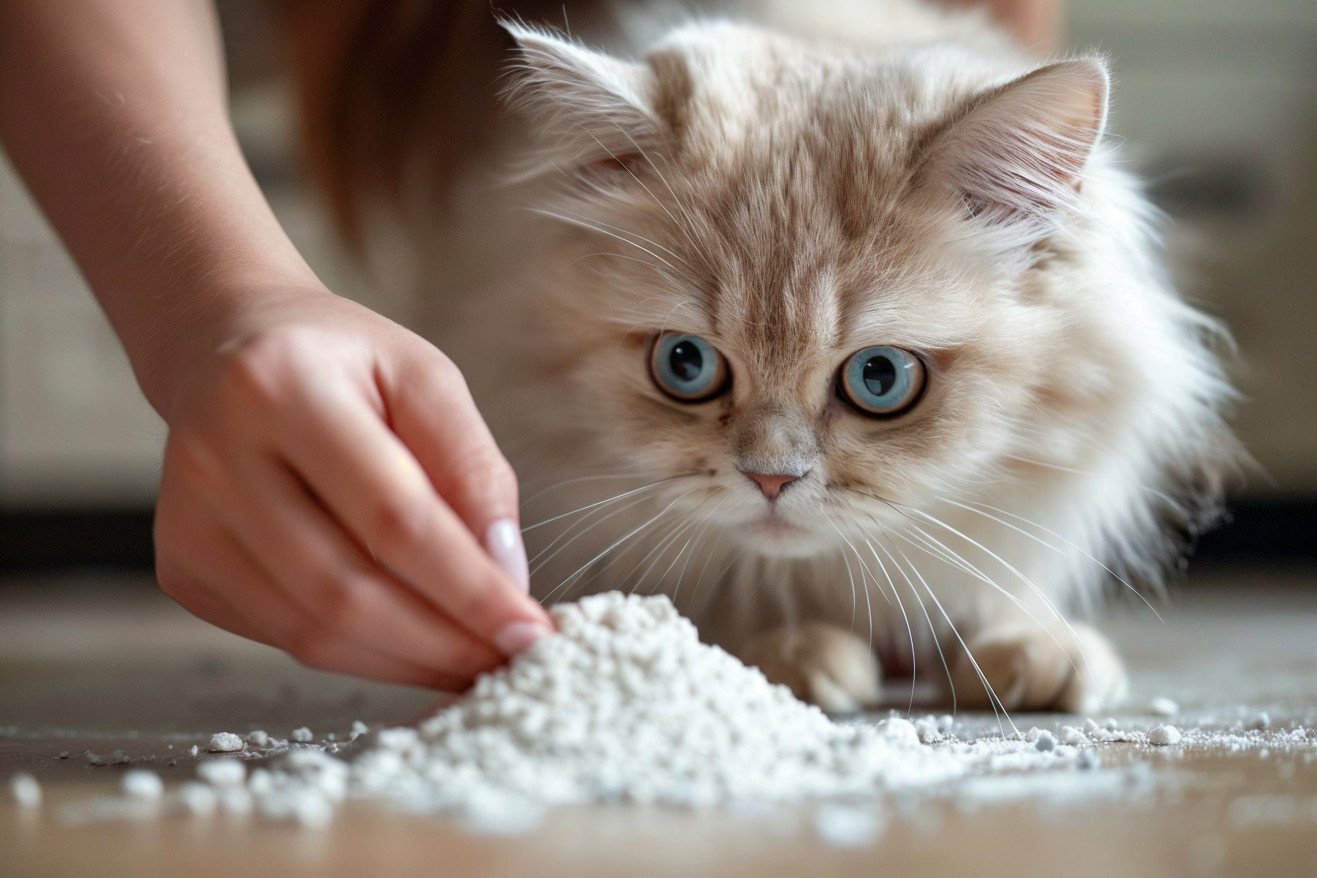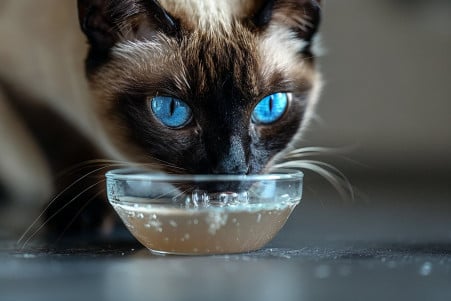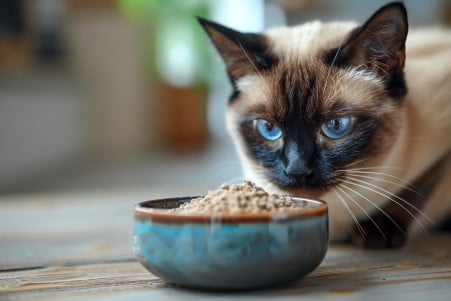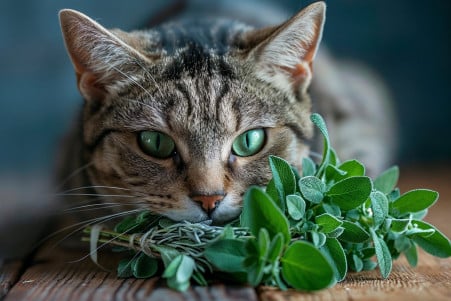Can Cats Be Around Baking Soda? A Vet Weighs In
7 June 2024 • Updated 6 June 2024

If you're a cat owner, you may have considered using baking soda in your home, but you may be wondering if it's safe to use around your feline friend. While baking soda is generally safe for cats and has low toxicity when ingested in small amounts, it can lead to gastrointestinal upset, including vomiting and diarrhea, if ingested in large amounts. This means that you should still be cautious about how much your cat is exposed to.
To give you a complete overview of this topic, we've evaluated information from reputable sources in the veterinary community, studies on feline toxicology, and sought out expert advice. This evidence-based method will ensure that you have all the information you need to understand the potential dangers and safety measures associated with using baking soda around cats. This way, you can use the information to decide whether or not you want to use this common household item around your cat.
Is baking soda safe for cats?
Baking Soda Toxicity in Cats: Symptoms and Treatment
Because cats are so much smaller than humans, they can be poisoned by ingesting large amounts of baking soda. In general, more than 1-2 teaspoons of baking soda is considered toxic for cats, according to The Spruce Pets. Symptoms of baking soda toxicity in cats include vomiting, diarrhea, lethargy, tremors, seizures, respiratory depression, and ataxia, according to the American College of Veterinary Pharmacists. These symptoms can develop within 3 hours of ingestion.
Toxicosis can result from the ingestion of 10-20 g/kg of the animal’s body weight, according to the American College of Veterinary Pharmacists. If your cat has ingested a toxic amount of baking soda, it’s important to seek immediate veterinary care to treat electrolyte imbalances and other issues that may arise, according to The Spruce Pets. While some first aid measures, such as vomiting induction and activated charcoal administration, may be helpful, they should only be performed under the guidance of a veterinarian to prevent further complications. That said, baking soda toxicity in cats can often be treated successfully if it’s caught and addressed quickly.
How to Use Baking Soda Safely in a Home With Cats
According to Cats Luv Us, there are a number of ways to use baking soda in a home with cats for cleaning and deodorizing, as long as you take the proper precautions. For example, you can sprinkle baking soda on carpets, furniture, and pet bedding to help absorb odors. However, you need to make sure to vacuum it up completely to avoid your cat ingesting it. You can also use baking soda to clean litter boxes, but you need to make sure to rinse it thoroughly to avoid leaving behind any residue that your cat might consume, according to PetMD.
In general, when using baking soda for cleaning, you need to make sure to keep surfaces dry and keep the product in a safe place where your cat can't get to it, according to Cats Luv Us. In addition, you should always test baking soda on surfaces before using it and monitor your cat for any adverse reactions to make sure it's safe for them, according to One Fur All Pets.
Other Cat-Safe Substitutes for Baking Soda
If you'd rather not use baking soda, even in small amounts, there are other natural cleaning options that are safe for cats, according to Catster. Vinegar, lemon juice, and hydrogen peroxide are all natural cleaning and deodorizing agents that can be found in many homes, but they are not entirely safe for cats, according to Preventive Vet.
Enzyme-based cleaners and pet-safe laundry detergents are safer cleaning products to use around pets, according to Preventive Vet. You can also make your own pet-safe cleaning products using ingredients like distilled white vinegar, coconut oil, and essential oils such as rosemary and lavender, as suggested by Environment 911.
No matter what cleaning products you use, it's important to follow safety instructions, make sure the area is well-ventilated, and keep the products out of your pet's reach, according to Environment 911. This will help you avoid any accidents and keep your cat safe and healthy.
Baking Soda and Cat Dental Care: Myths and Facts
One of the most common myths about baking soda and cat dental care is that it can be used to brush a cat's teeth. However, veterinary experts advise against this practice. According to VCA Animal Hospitals, baking soda is highly alkaline and can cause stomach upset if ingested during teeth brushing.
Instead, cat parents should use toothpaste made especially for cats, which is formulated to be safe for cats to swallow and flavored to be appealing to them, according to Healthy Paws Pet Insurance. For a homemade option, coconut oil can be used as a natural cat toothpaste because it has antimicrobial and anti-inflammatory properties.
It's important to note that regular dental care, including professional cleanings, is necessary to ensure a cat's dental health. However, with the right products and precautions, cat parents can help maintain their cat's dental health and avoid the potential dangers of using baking soda to brush their cat's teeth.
Conclusion: How to Use Baking Soda Safely Around Cats
While baking soda is safe for cats in small amounts, it’s important to use it with care to avoid overconsumption. Ingesting too much baking soda can cause cats to experience gastrointestinal distress, electrolyte imbalances, and other health issues, according to WagWalking.
If you want to use baking soda for cleaning or deodorizing purposes, it’s important to make sure that your cat can’t accidentally ingest it. If you’d rather not use baking soda, Catster and Environment 911 both recommend using other natural cleaning products or making your own pet-safe cleaning solutions.
To use baking soda safely around cats, make sure to use it in moderation, store it properly, and watch for signs of an allergic reaction. With these precautions in mind, cat owners can use baking soda in their homes without putting their pets at risk.


